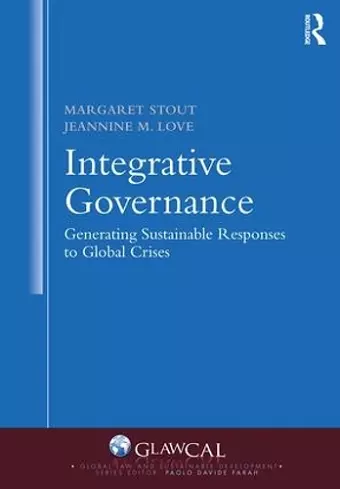Integrative Governance: Generating Sustainable Responses to Global Crises
Margaret Stout author Jeannine M Love author
Format:Hardback
Publisher:Taylor & Francis Ltd
Published:2nd Aug '18
Currently unavailable, and unfortunately no date known when it will be back
This hardback is available in another edition too:
- Paperback£41.99(9780367473747)

Dominant governance theories are drawn primarily from Euro-American sources, including emergent theories of network and collaborative governance. The authors contest this narrow view and seek a more globally inclusive and transdisciplinary perspective, arguing such an approach is more fruitful in addressing the wicked problems of sustainability—including social, economic, and environmental crises. This book thus offers and affirms an innovative governance approach that may hold more promise as a "universal" framework that is not colonizing in nature due to its grounding in relational process assumptions and practices. Using a comprehensive Governance Typology that encompasses ontological assumptions, psychosocial theory, epistemological concepts, belief systems, ethical concepts, political theory, economic theory, and administrative theory, the authors delve deeply into underlying philosophical commitments and carry them into practice through an approach they call Integrative Governance. The authors consider ways this approach to radical self-governance is already being implemented in the prefigurative politics of contemporary social movements, and they invite scholars and activists to: imagine governance in contexts of social, economic, and environmental interconnectedness; to use the ideal-type as an evaluative tool against which to measure practice; and to pursue paradigmatic change through collaborative praxis.
'Integrative Governance is a richly powerful, cross-disciplinary book. It captures the voice of Mary Parker Follett’s work, the essence of German existential thought, and applications to governance. Moreover, the book cuts across disciplines including public administration, political science, economics, and sociology. In this sense, the book serves as a compass to navigate administrative theory in the 21st century through its accessibility and utility.'
Arthur Sementelli, Florida Atlantic University, USA
'Stout and Love have crafted a deeply intellectual, yet praxis focused text on integrative governance. It covers the expected topics, with a detailed philosophical account of governance being the value-added contribution. This text is a must for those responsible for constructing the genuine and nuanced integrative governance demanded by contemporary issues.'
Robyn Keast, Southern Cross University, Australia
This book is an exemplar of how all books in public governance ought to make the philosophical foundations of the proposed argument explicit, to enable the most fruitful of dialogues in the field. My ontology is different than the authors’ yet my admiration for such a thoroughly crafted work is paramount.'
Edoardo Ongaro, The Open University, UK
'Embracing an "attachment to existence" and defying the widespread skepticism and "sustained cynicism" of mainstream political science in the face of global crises, Margaret Stout and Jeannine Love have written a remarkable book. By articulating a relational, process-oriented and integrative approach to governance, they attempt to break the iron grip of rationalistic, dualistic, hierarchical, and economistic thinking on our understanding of state, citizen, nature and society, as well as our self-image as academic professionals. Drawing on the work of Mary Follett, Alfred Whitehead and their contemporary followers such as William Connolly, they systematically build a coherent and affirmative alternative that anchors the administrative, economic and democratic aspects of integrative governance in a process-based cosmology and epistemology. No one will walk away from this book without a wealth of new, inspirational insights.'
Hendrik Wagenaar, King’s College London, UK and The University of Vienna, Austria
'This book is an intense reflection and an extensive theoretical contribution to a unitary understanding and valuing of how to act in the complex processes of governance in our time. It is not just a contestation of the resigned advocacy of traditional PA theories, nor an idle, cosmetic revamping of novelties advanced by Follett and other classical process theorists. Stout and Love offer testimony and committed persuasion for multiple ways of creative resistance to the seemingly uncontestable forces of growing global inequity, violence, and mistrust - the futility of which is a deception.'
Ricardo Schmukler, University of Buenos Aires, Argentina
‘Margaret Stout and Jeannine Love have accomplished the extraordinary task of bringing the fullness of Mary Parker Follett’s philosophy and scholarship to the field of public administration in their conceptualization of "integrative governance," an approach to governance (not government) deeply situated in Follett’s principles of association and in radically democratic processes. Stout and Love adeptly show that now is the time to turn to integrative governance to aid in ameliorating the wicked and gnarly problems in this era of global, transnational governance. This book contains the seeds of transformational regime change, globally, transnationally, trans-disciplinarily, and trans-organizationally/trans-jurisdictionally. Read it.’
Cheryl Simrell King, The Evergreen State College, USA
ISBN: 9781138695733
Dimensions: unknown
Weight: 635g
260 pages